The Hidden Cruelty of Rodeo: Tragic Deaths at the Calgary Stampede
Urging Society to Rethink Tradition for the Sake of Animal Welfare
As an advocate for animal welfare, it is with a heavy heart that I address the recent tragic events at the Calgary Stampede. The euthanasia of a steer and two horses during this year's rodeo competition has once again brought to light the inherent cruelty and risks associated with these events. Despite the Stampede's claims of adhering to strict animal care standards, the reality is that the physical and psychological toll on the animals is undeniable.
Recent Incidents
The first incident involved a steer that sustained an injury during an unusual occurrence on Monday night, July 8th. Despite immediate medical attention, the severity of the injury led veterinarians to decide on euthanasia. This followed the euthanasia of a chuckwagon horse injured during a race on Friday, July 5th, and another horse used by an outrider in the chuckwagon competition on Saturday, July 6th. These incidents are not isolated; they are part of a troubling pattern that underscores the dangers animals face in rodeo sports.
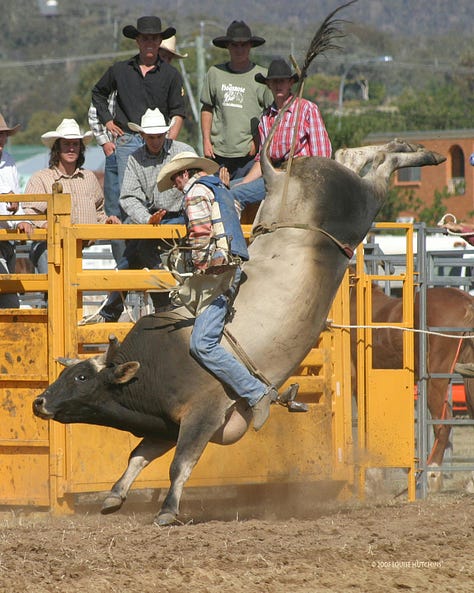
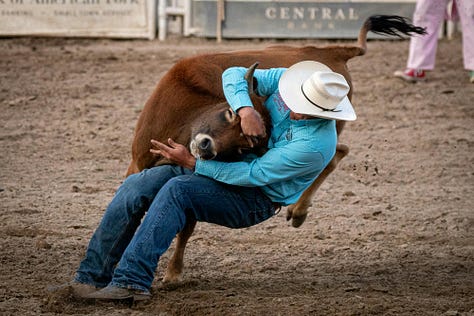
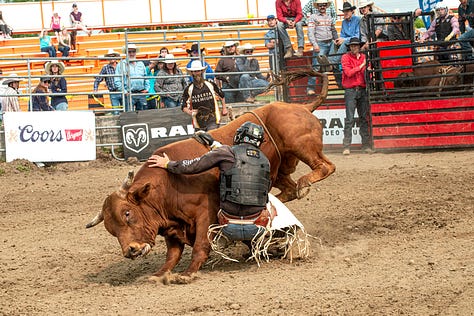
The Inherent Cruelty of Rodeo
In my years of advocating for animal welfare, I have often highlighted the cruelty inherent in rodeo practices. In my article Rodeo: state sanctioned animal cruelty, I detailed how animals are subjected to extreme stress and physical harm to make the events more thrilling for spectators. Tools like electric prods, bucking straps, and spurs are used to provoke animals into displaying exaggerated reactions, often resulting in severe injuries such as broken ribs, torn ligaments, and even death.
The Challenge of Balancing Tradition and Ethics
The Calgary Stampede, with its deep-rooted cultural significance, faces the challenge of balancing tradition with evolving societal values regarding animal welfare. However, the repeated occurrences of animal injuries and deaths suggest a systemic issue that cannot be overlooked. The Stampede’s commitment to animal welfare is increasingly being questioned as more such incidents come to light.
Animal welfare organizations are calling for a reevaluation of the use of animals in rodeo events, advocating for either stricter regulations or a complete ban on such practices, as I did in my June 8 article End the Cruelty of Rodeo.
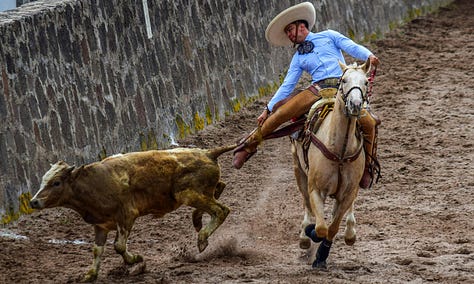
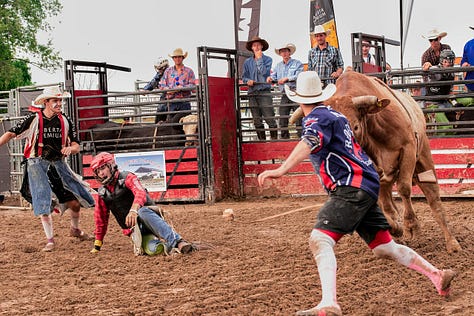
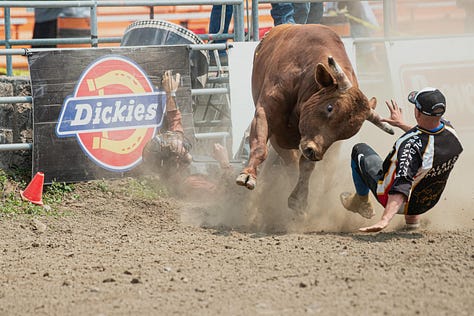
The recent events at the Calgary Stampede serve as a stark reminder of the ongoing ethical dilemmas in rodeo sports. As public awareness and concern for animal welfare continue to grow, the pressure on rodeo organizers to implement significant changes is likely to intensify. The debate over the future of rodeo events, including the Calgary Stampede, is far from over, and the coming years will be crucial in determining whether these traditions can adapt to modern ethical standards or face eventual obsolescence.
A Call to Action: Steps to End Rodeo Cruelty
As someone who has dedicated my life to animal welfare, I urge the public to consider the suffering that these animals endure for the sake of entertainment. It is time for a serious reevaluation of rodeo practices and for society to take a stand against the cruelty that is too often hidden behind the spectacle of the show. The animals deserve better, and it is our responsibility to ensure their welfare is prioritized over tradition and entertainment. We can, and we must, find ways to honor our heritage while upholding our ethical standards.
The history and prevalence of rodeos in the United States underscores the urgent need for comprehensive reform. The industry's economic and cultural significance has allowed it to evade meaningful oversight and accountability, perpetuating the suffering of countless animals. Animal welfare advocates must continue to challenge the industry's practices, educate the public, and push for legislative and regulatory changes that prioritize the wellbeing of the animals over profit and tradition.
The time for change is now. We have a moral obligation to be the voice for those who cannot speak for themselves. It is time for animal welfare professionals, policymakers, and the public to take the following action to end the cruelty of rodeos:
Advocate for comprehensive bans on rodeo events at the state and local level, following the lead of jurisdictions that have already taken this important step. Resources like the advocacy efforts of SHARK can provide guidance and support.
Demand robust regulations and enforcement mechanisms to protect the welfare of animals used in rodeos, including mandatory veterinary oversight and severe penalties for violations. The Animal Welfare Institute offers policy recommendations and model legislation to strengthen animal protections.
Support legislation that closes the regulatory loopholes and ensures that anti-cruelty laws apply equally to these events. Organizations like the Animal Legal Defense Fund can provide information on current bills and advocacy opportunities.
Educate the public about the realities of rodeo and encourage them to boycott these cruel spectacles, redirecting their entertainment dollars towards more humane alternatives. Resources like the PETA can help share the facts about rodeo cruelty.
Partner with animal welfare organizations to investigate and expose instances of abuse, and pursue legal action against rodeo operators who flagrantly disregard the wellbeing of the animals in their care.
Our collective admiration for our Western heritage and its celebration of rugged individualism runs deep. But do we truly need to subject sentient beings to such cruelty to preserve our connection to the past? Surely, there are ways to uphold the cowboy ethos and honor our cultural traditions without perpetuating the cycle of abuse synonymous with the rodeo. It's time to confront this incongruity and forge a new path—one where our compassion for animals supersedes antiquated notions of frontier bravado.
Ed Boks is a former Executive Director of the New York City, Los Angeles, and Maricopa County Animal Care & Control Departments. He is available for consultations. His work has been published in the LA Times, New York Times, Newsweek, Real Clear Policy, Sentient Media, and now on Animal Politics with Ed Boks.

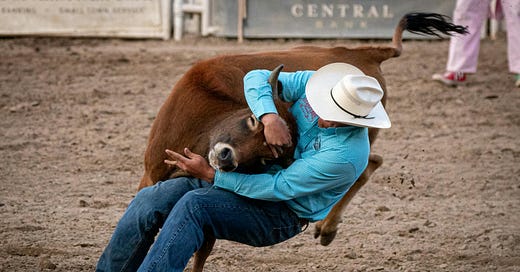



A great example of a really bad piece of so-called anti-rodeo legislation is the proposed LA ordinance which purports to protect rodeo animals. It not only fails to address the source of 95% of the cruelty which occurs outside the arena before and after the actual rodeo. (I won't elaborate since there are countless articles documenting the horrible treatment of rodeo animals in preparation for a rodeo performance. ).
But what really makes the ordinance a farce is how it's expected to be enforced. Guess who is charged with the responsibility for monitoring the treatment of the animals and expected to report abuse? The friggin' rodeo vet!!! Don't know whether to laugh or scream. So the vet paid by the rodeo is the one that's gonna call the cops on the rodeo?!?!?! Yeah right. This horrible and unenforceable law was written by the LA City Attorney's Office which was famous in the early 2000's for creating a model Animal Cruelty Task Force and Animal Protection Unit. But that Office has undone virtually all the efforts achieved during that time and now is drafting laws that they know are unenforceable and will do nothing for animals.
. It irks me to no end that even when I've revealed the shortcomings of the law and how it's pretty much useless and a scam, animal groups and individuals still support it. Some say it's better than nothing. WRONG! Ineffective legislation simply prevents effective legislation. A weak law is sometimes better than nothing but a law that scams the public into thinking it's protecting animals when it's not is worse than nothing at all because it guarantees there won't be an effective law for who knows when. Legislators will refuse to consider an effective law because they'll say they already addressed the issue and they have other priorities. So if this law passes you can forget any future attempts to actually protect rodeo animals. Because of the inherent cruelty that must be a part of a rodeo, anything short of a total ban is unacceptable. What's really ironic about all this is that the LA City Council was willing to ban the use of circus animals but not the far worse practice of rodeos.
Frankly, the rodeo people are probably behind closed doors celebrating this ordinance knowing damn well it's a useless law. If I was a rodeo attorney and asked to write a law that looks like it's protecting rodeo animals but doesn't to prevent a total ban being passed...this is the law I'd write. And I'm serious about that!
Shame on the LA City Attorney for enabling and perpetuating cruelty to rodeo animals knowing full well that the law will never be enforced and use up their "valuable" resources in court. Shame!!!
Excellent call to action, Ed! Rodeos are entrenched in our culture. It’s going to be difficult to make these changes but we must advocate!